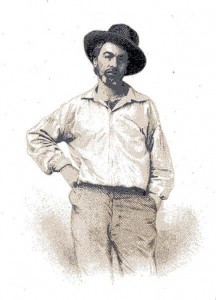Mar
Week 51: Nutcracker Buck Sings “At the Dump”
by Nutcracker Buck in Uncategorized

This is the last blog post. Next week there’s a song and video, but I’m going to do the wrap-up now.
So here are some observations about the experience of being a lifelong non-songwriter who decides to write approximately one song a week for a year or so and a few questions answered in a sideways fashion.
Verdict. I’m glad I did this. In two weeks or a month or five years I may look back on it as a horrifying embarrassment, but I don’t think so, since (i) I don’t plan to ever look at any of this stuff again and (ii) if it was really that bad, I have faith that most people are decent enough that they will avoid mentioning it. As indeed most people have been so far. (I’d be more embarrassed, I think, if anybody knew how seriously I took this thing. Or at least how seriously I took it up to a couple of weeks ago when I had my Neil-Armstrong-after-a-five-day-drunk moment: “I walked on what?”) I know that if I had looked back very far at any point in the project I would have abandoned it. Whether it was wise to continue is unknowable, but for now I’m calling it a success just because it is finished. I said early on, in one of my fits of handwringing about whether to continue, that I had a habit of not finishing things once I knew they were finishable, that once I saw that something could be done, it didn’t seem necessary to actually do it. I went through that same sort of logic when I was drinking. I would stop for long enough to see that it was possible to stop, at which point I would start again, having, to my mind, proved something. I had proved something, of course: I’d proved the opposite of what I thought I was proving.
I know that if I had looked back very far at any point in the project I would have abandoned it. Whether it was wise to continue is unknowable, but for now I’m calling it a success just because it is finished. I said early on, in one of my fits of handwringing about whether to continue, that I had a habit of not finishing things once I knew they were finishable, that once I saw that something could be done, it didn’t seem necessary to actually do it. I went through that same sort of logic when I was drinking. I would stop for long enough to see that it was possible to stop, at which point I would start again, having, to my mind, proved something. I had proved something, of course: I’d proved the opposite of what I thought I was proving.
Why Did I Decide To Do This? I used to write novels. Obsessively. I kept it a secret from most people, and I kept the extent of it secret from everybody. The fact is, all I did was write novels (after figuring out in my early twenties that I couldn’t write short stories) for about sixteen or seventeen years. When I got married and started working at a real job, I wrote early in the morning, late at night, at lunch (when I worked downtown, at lunch time I’d go over to the old Carnegie library, now the History Center, and sit in the lobby of that quiet old building and write in longhand. I wrote two novels that way.) Many of them were, and are, unfinished. Several did get finished. My typical method was to work very hard and be very committed to the novel until it was done or until the end was in sight, be convinced it was the greatest novel ever written, send queries to fifteen agents, get the rejections back, and meanwhile decide the novel was no good and immediately start another one. Rinse and repeat. Each novel took one to two years. I worked on one about a messianic placekicker for six or seven years, maybe longer. I don’t think I ever finished it, because I finally figured out how it was going to end (it involves Buck Owens), so I didn’t need to finish it.
That’s not a healthy way to live, I determined. Whether I have any aptitude for that line of work, whether those novels are or were any good, is not even relevant, just as whether these songs are any good is not relevant (more on that below). The way I went about it was not any good. This time, failing publicly somehow presented itself as a more attractive option than failing secretly. That was part of what was behind the compulsion to write a song a week for a year. The alternative would have been to pretend I wasn’t a guy who’d spend a year in his garage writing songs for a nutcracker doll to sing. But I am that guy. So now you know.
What Have I Learned? Other than what I’ve just said, nothing. Or at least nothing jumps to mind. There are plenty of things I feel like I should have learned, some of which are things that other people are born knowing or learn early in life, but I can’t say that I’ve learned them yet.
But it’s a process, right? The work is its own reward. That’s the kind of stuff I’m talking about, the stuff I know but haven’t . . . learned. So that’s something, I guess–knowing things but knowing you haven’t really learned them.
What Will I Do For My Next Trick? I don’t know. The songwriting began as a stunt and then, I think, I got (sporadically) better at it. I don’t have any burning ambition to write songs, but then again burning ambitions are something I’m trying to avoid at this age. The attitude I took toward the songs was, “I need one a week.” Some weeks, most probably, were nothing to celebrate. A few have, I believe, commercial potential, and for awhile I thought I would pursue that angle, but now I know I won’t. I’m pretty sure my songwriting days are over. This is as far as any of this stuff goes.
But it was edifying to approach something from the standpoint of a professional, or at least a craftsman, rather than that of an artist. I have a greater respect for craft than I did when I was kid. Back then it was all about inspiration and passion–Whitman’s yawp and the 10,000 words a day Thomas Wolfe just couldn’t contain, just had to pour out for the benefit of posterity. I don’t regret or disown any of that, but the priest who goes to work Sunday morning and says the exact same thing the priest across town and across the ocean is saying, well, that’s something, too. Just going through the motions can be ennobling, too.
and the 10,000 words a day Thomas Wolfe just couldn’t contain, just had to pour out for the benefit of posterity. I don’t regret or disown any of that, but the priest who goes to work Sunday morning and says the exact same thing the priest across town and across the ocean is saying, well, that’s something, too. Just going through the motions can be ennobling, too.
How Many Songs Were Left Over? A bunch! I didn’t realize how many until I just started thumbing through the books. But don’t worry, you’re not missing much. There aren’t many that would have made the cut at this late stage (and, honestly, you could say that about a whole lot of them that did get used.) I do consider it a victory that I never had to use “Quirky People.” I would have liked to use “I Think Your Cat Pissed in My Truck,” but Chevrolet doesn’t make S-10’s anymore, which screwed up the main rhyme in the song.
What Was Left Undone? I wanted to write about Red Headed Stranger, how Willie Nelson created a thing entirely new under the sun by using scraps of stuff littered throughout his own pop cultural history, how that album exemplifies transcending the personal into the public. I wanted to write about Merle Haggard’s perfect “Sing Me Back Home,” the strange jump backwards in the second verse that makes what would have otherwise been a sentimental prison song instead a work worthy of comparison to Chekhov.  I wanted to put down everything I know about music theory, which isn’t that much but which became an early key to the universe for me; I wanted to celebrate the circle of fifths. I wanted to write about the Rule Against Perpetuities, the only thing in law school I learned and understood better than anybody else but in a way that has no application to the law. And I owe Fussy the story of how I got to Fayetteville and the refinement of the Tom T. Hall Principle, which I will get to her in some fashion.
I wanted to put down everything I know about music theory, which isn’t that much but which became an early key to the universe for me; I wanted to celebrate the circle of fifths. I wanted to write about the Rule Against Perpetuities, the only thing in law school I learned and understood better than anybody else but in a way that has no application to the law. And I owe Fussy the story of how I got to Fayetteville and the refinement of the Tom T. Hall Principle, which I will get to her in some fashion.
What Happened to Week 50? I really don’t know. I started reading A Wrinkle in Time to the kids last week, and I think maybe Week 50 got sucked into a tesseract. It’ll show up somewhere, I think. My next project might be called The Week 50 Project.
Are These Songs Any Good? They were good when they left here. After that, I can’t say. But there really aren’t any bad songs, only bad songwriters.